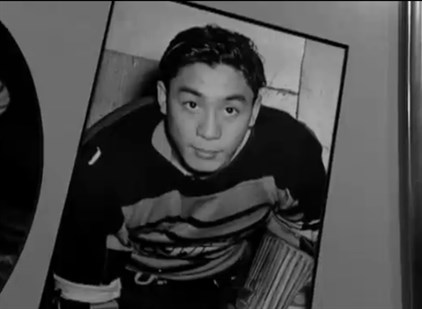
Larry Kwong wore the No. 11 jersey with the New York Rangers in a game against the Montreal Canadiens in 1948.
Image Credit: Wikimedia Commons
August 29, 2014 - 7:08 AM
VERNON - From the frozen ponds of Vernon to the rink of a big league game, Larry Kwong became many things: The first to break the colour barrier in the NHL, a hero to countless fans, and an inspiration that anyone, no matter what their heritage, can follow their dreams.
And yet the 92-year-old has remained exceedingly humble. He never did it for fame. He told his mother he wanted to use his talent playing hockey to buy her a home, and he did. He filled stadiums with the Chinese Canadians who never before had much interest in the white man’s sport.
But Kwong was also denied work, turned away from a haircut, called names and further racist indignities. It’s all documented in a new film, The Shift: The Story of the China Clipper.
“It’s mainly about his journey to get to the NHL. He had to get through a lot of adversity to make it to play in that one game,” producer Chester Sit says.
Kwong’s ice time in the NHL playing for the New York Rangers only lasted about 90 seconds, but it was enough to make history.
“It’s amazing to have someone like him break that barrier especially in a time racism was pretty thick,” Sit says. “In the NHL they only talk about Willie O’Ree who was the first black player in the NHL in 1958, that’s their official story of when the colour barrier was broken. They don’t even mention Larry who did it ten years earlier.”
Kwong, the youngest of 15 children, was born and raised in Vernon where his father ran a general store called Kwong Hing Lung, meaning ‘abundant prosperity.’ There wasn’t artificial ice when Kwong was a hockey crazy kid. He had to wait for lakes and ponds to freeze over in the winter, and sometimes hiked up into the hills above Vernon where it iced up faster.
“One time we skated on the pond and it wasn’t frozen solid. Every time we stepped on the ice the water would come out over our skates and we skated that way anyway,” Kwong says. “We were crazy. I couldn’t even swim.”
He played for the Vernon Hydrophones and at 18, was drafted by the Trail Smoke Eaters. He moved to Trail and hoped to make some money working at the smelter with his teammates, but was turned away. He may have been known for his talent on the ice, but out in the world, he was still Chinese.
“I toughed it out, and what can you do? This was the way that it was,” Kwong says.
Kwong was born in 1923, the same year Canada enacted the Asian Exclusion Act, barring Chinese immigrants entry.
“There was so much virulent anti-Asian sentiment that he grew up with,” Sit says. “What Larry did was more amazing because of the time he lived in. He says all he wanted to do was chase his dream.”
He went on to play for the Valleyfield Braves in Quebec, spent a season with the Nottingham Panthers in Britain and coached hockey in Switzerland, making him the first professional hockey coach of Chinese descent.
The film includes interviews with ten-time Stanley Cup winner Jean Beliveau, Ken King, president of the Calgary Flames and Herb Carnegie, one of the first black professional hockey players.
The film is currently playing on the OMNI network in Cantonese and the producers are looking at additional ways to distribute it to viewers.
To contact the reporter for this story, email Charlotte Helston at chelston@infotelnews.ca or call 250-309-5230. To contact the editor, email mjones@infotelnews.ca or call 250-718-2724.
News from © iNFOnews, 2014